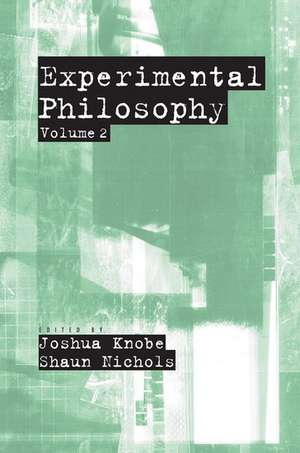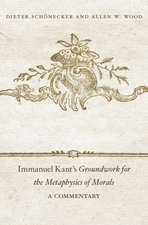Experimental Philosophy: Volume 2
Editat de Joshua Knobe, Shaun Nicholsen Limba Engleză Paperback – 16 ian 2014
| Toate formatele și edițiile | Preț | Express |
|---|---|---|
| Paperback (2) | 270.90 lei 40-51 zile | |
| Oxford University Press – 17 iul 2008 | 270.90 lei 40-51 zile | |
| Oxford University Press – 16 ian 2014 | 284.69 lei 40-51 zile | |
| Hardback (2) | 843.58 lei 40-51 zile | |
| Oxford University Press – 16 ian 2014 | 843.58 lei 40-51 zile | |
| Oxford University Press – 7 aug 2008 | 885.95 lei 40-51 zile |
Preț: 284.69 lei
Preț vechi: 313.53 lei
-9%
Puncte Express: 427
Preț estimativ în valută:
50.35€ • 59.70$ • 43.83£
50.35€ • 59.70$ • 43.83£
Carte tipărită la comandă
Livrare economică 27 martie-07 aprilie
Specificații
ISBN-13: 9780199927401
ISBN-10: 0199927405
Pagini: 392
Ilustrații: 93 illus.
Dimensiuni: 155 x 234 x 31 mm
Greutate: 0.57 kg
Editura: Oxford University Press
Colecția OUP USA
Locul publicării:New York, United States
ISBN-10: 0199927405
Pagini: 392
Ilustrații: 93 illus.
Dimensiuni: 155 x 234 x 31 mm
Greutate: 0.57 kg
Editura: Oxford University Press
Colecția OUP USA
Locul publicării:New York, United States
Recenzii
Experimental Philosophy: Volume 2 is a good companion to Experimental Philosophy and I'd recommend it to anyone who has read the first volume Both volumes are accessible to the general reader and both offer a good introduction to a variety of the issues being explored by experimental philosophy.
Experimental philosophy is one of the most exciting and controversial developments in philosophy in recent years. Whether it undermines or extends the methods of traditional philosophy, it raises questions that go to the heart of philosophical inquiry. This book collects many key experimental studies and theoretical analyses, bringing the reader to the leading edge of the current debate.
Many philosophical questions are about human concepts. But the diversity of the philosophers' intuitions suggests that our intuitive access to concepts is far from reliable. So why not explore human intuition experimentally by studying the intuition of our fellow humans? This sane and productive idea has been the impetus for the new experimental philosophy; and this book brings some of the best of that work-including some important reflections on the questions of method it raises- together. Anyone who is interested in what is going on in philosophy now should read this stuff.
In the good old days, science and philosophy were one, and philosophers were the leading scientists of their day. Then philosophers took to admiring science from a distance, and philosophy became, for scientists, a distant memory of sophomore year. But the good old days are coming back, and this volume heralds their arrival. Philosophers are once again discovering interesting things about the human mind, and scientists are once again discovering philosophy. Read this book, and find out what the buzz is about.
Experimental philosophy is one of the most exciting and controversial developments in philosophy in recent years. Whether it undermines or extends the methods of traditional philosophy, it raises questions that go to the heart of philosophical inquiry. This book collects many key experimental studies and theoretical analyses, bringing the reader to the leading edge of the current debate.
Many philosophical questions are about human concepts. But the diversity of the philosophers' intuitions suggests that our intuitive access to concepts is far from reliable. So why not explore human intuition experimentally by studying the intuition of our fellow humans? This sane and productive idea has been the impetus for the new experimental philosophy; and this book brings some of the best of that work-including some important reflections on the questions of method it raises- together. Anyone who is interested in what is going on in philosophy now should read this stuff.
In the good old days, science and philosophy were one, and philosophers were the leading scientists of their day. Then philosophers took to admiring science from a distance, and philosophy became, for scientists, a distant memory of sophomore year. But the good old days are coming back, and this volume heralds their arrival. Philosophers are once again discovering interesting things about the human mind, and scientists are once again discovering philosophy. Read this book, and find out what the buzz is about.
Notă biografică
Joshua Knobe is Associate Professor of Philosophy and Cognitive Science at Yale University.Shaun Nichols is Professor of Philosophy at the University of Arizona.
























